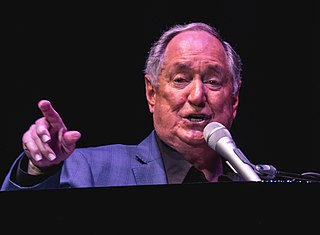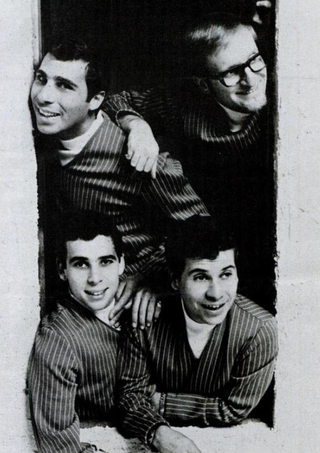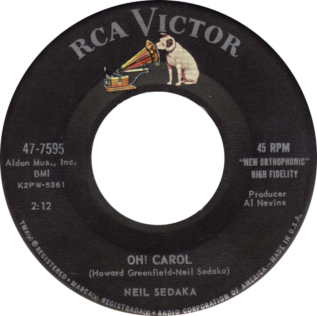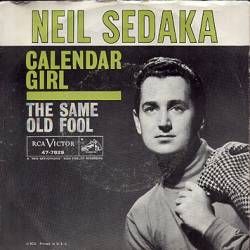
Neil Sedaka is an American singer, songwriter and pianist. Since his music career began in 1957, he has sold millions of records worldwide and has written or co-written over 500 songs for himself and other artists, collaborating mostly with lyricists Howard "Howie" Greenfield and Phil Cody.

The Tokens were an American doo-wop band and record production company group from Brooklyn, New York City. The group has had four top 40 hits on the Billboard Hot 100, all in the 1960s, their biggest being the chart-topping 1961 hit single "The Lion Sleeps Tonight". "The Lion Sleeps Tonight" borrowed heavily from the 1939 song "Mbube" by South African singer Solomon Linda. They are also known for having Neil Sedaka as an original member, before he pursued a solo career.

Howard Greenfield was an American lyricist and songwriter, who for several years in the 1960s worked out of the famous Brill Building. He is best known for his successful songwriting collaborations, including one with Neil Sedaka from the late 1950s to the mid-1970s, and near-simultaneous songwriting partnerships with Jack Keller and Helen Miller throughout most of the 1960s.

"Happy Birthday Sweet Sixteen" is a pop song released in 1961 by Neil Sedaka. Sedaka wrote the music and performed the song, while the lyrics were written by Howard Greenfield. The song is noted for being similar in musical structure to Take Good Care of My Baby by Bobby Vee, and additionally for its resemblance to the melody of the Chiffons' subsequent 1963 hit "One Fine Day". Both of these songs exhibiting similarity to "Happy Birthday Sweet Sixteen" were penned by the team of Carole King and Gerry Goffin. The song reached #6 on the Billboard Hot 100 chart and No. 3 on the UK Singles Chart.

"Laughter in the Rain" is a song composed and recorded by Neil Sedaka, with lyrics by Phil Cody. It includes a 20-second saxophone solo by Jim Horn. The song hit No. 1 on the Billboard Hot 100 in February 1975.

"Breaking Up Is Hard to Do" is a song recorded by Neil Sedaka, co-written by Sedaka and Howard Greenfield. Sedaka recorded this song twice, in 1962 and 1975, in two significantly different arrangements, and it is considered to be his signature song. Between 1970 and 1975, it was a top-40 hit three separate times for three separate artists: Lenny Welch, The Partridge Family and Sedaka's second version. The song was also adapted into multiple languages, most notably in Italian and French.
"Love Will Keep Us Together" is a song written by Neil Sedaka and Howard Greenfield. It was first recorded by Sedaka in 1973. The brother-sister duo Mac and Katie Kissoon also recorded a version in 1973. American pop duo Captain & Tennille covered it in 1975, with instrumental backing almost entirely by “Captain” Daryl Dragon, with the exception of drums played by Hal Blaine; their version became a worldwide hit.

"Bad Blood" is a popular song written by Neil Sedaka and Phil Cody. The song, with uncredited backing vocals by Elton John, reached number one on the Billboard Hot 100 in 1975, remaining at the top position for three weeks. It was certified Gold by the RIAA and was the most successful individual commercial release in Sedaka's career. "Bad Blood" was replaced at the number one spot by John's single "Island Girl".

"Oh! Carol" is an international hit written by Neil Sedaka and Howard Greenfield in 1958, and recorded by Sedaka.

"Calendar Girl" is a song by Neil Sedaka. The music was composed by Sedaka and the lyrics by Howard Greenfield. Released in December 1960 as a single, it was a hit single for Sedaka, peaking at No. 4 on the US charts, No. 3 in Australia, and No. 1 on the Canadian and Japanese charts.
"The Diary" is a song by Neil Sedaka and Howard Greenfield. It was released in 1958 as Sedaka's debut single.

Neil Sedaka Sings Little Devil and His Other Hits is a solo album by Neil Sedaka released in 1961 immediately after the cover versions of earlier hits in Circulate.

Neil Sedaka Sings His Greatest Hits is a 1963 compilation album of twelve of the most popular hits of Neil Sedaka's tenure with RCA Victor.

"Stairway to Heaven" is a song written by Neil Sedaka and Howard Greenfield. It was released as a 45 rpm single and appeared on Sedaka's 1960 album Neil Sedaka Sings Little Devil and His Other Hits.
"Run Samson Run" is a song written by Neil Sedaka and Howard Greenfield and sung by Neil Sedaka. It appears on his album Neil Sedaka Sings Little Devil and His Other Hits. The song was included in Neil Sedaka Sings His Greatest Hits (1959–1963).
The following is a comprehensive discography of Neil Sedaka, the American singer.

The Many Sides Of Neil Sedaka is a 1978 compilation album released by RCA Victor Records containing the works of pop singer Neil Sedaka. The album contains some of Sedaka's lesser-known works in the period from 1958-1965, although three of the songs on the album were charting hits at the time of their original release.

"Where the Boys Are" is a song written by Neil Sedaka and Howard Greenfield for, and first recorded by, Connie Francis as the title track of the 1960 movie by the same name in which she was co-starring.

The Very Best of Neil Sedaka is a 2001 compilation album issued by RCA Records as part of their commemorative "100th Anniversary" series of albums celebrating their biggest stars. The album features some of Sedaka's best-known hits during his days with RCA, recorded from 1958 to 1963.

"One Way Ticket" is a song written by Jack Keller and Hank Hunter. It was originally performed by American singer Neil Sedaka and popularized by British disco band Eruption.
















